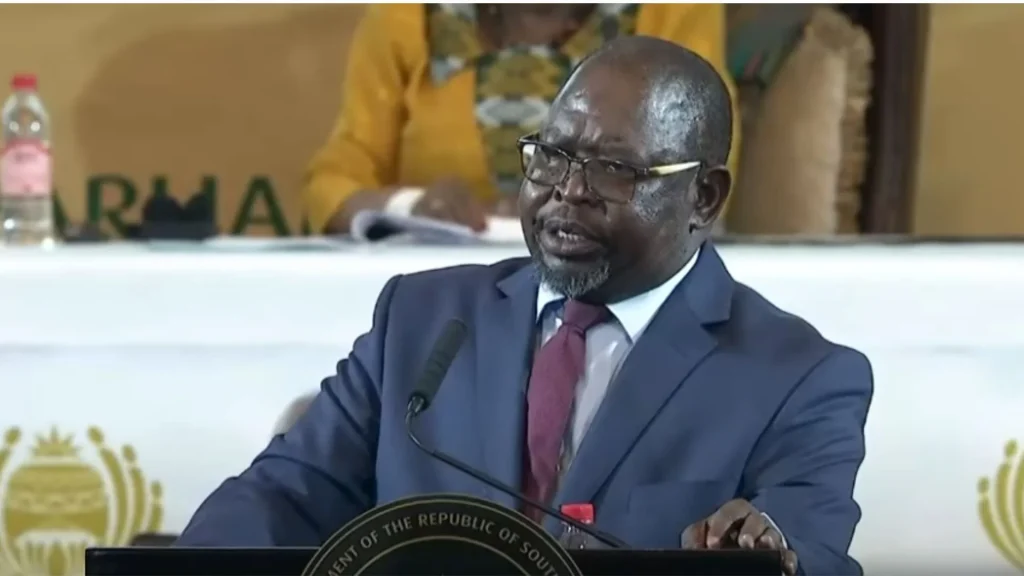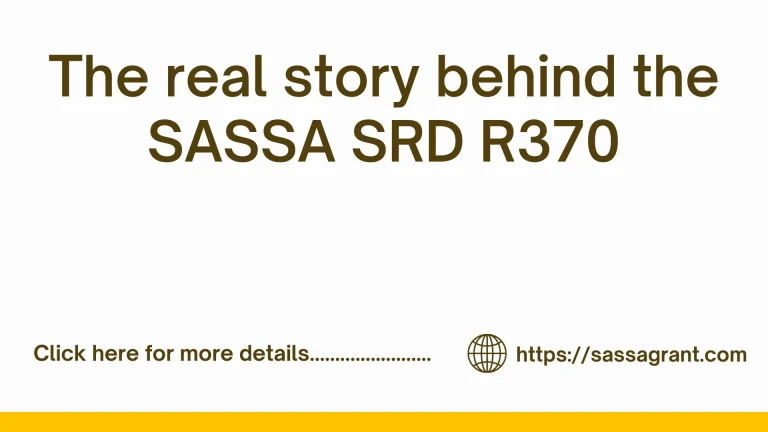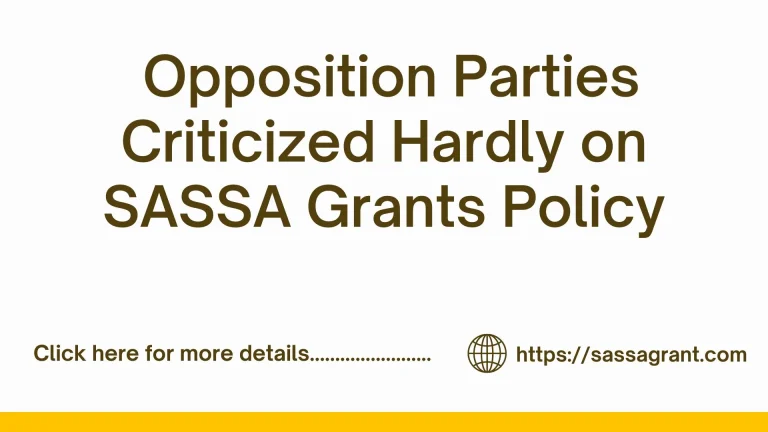SASSA Annual Budget Report 2024/25 – 2025/26
On Wednesday, February 21, 2024, the Minister of Finance, Mr Enoch Godongwana, presented the annual budget on the floor of the National Assembly at City Hall in Cape Town. During the budget speech, Enoch announced an accumulation regarding the SASSA Annual Budget allocation.
The Minister asserted that these grants are meant to support 19 million South African citizens in managing their monthly finances properly. He also reassured the public that the South African government would continue to provide such facilities as long as their government’s finances allowed.
An increase of R100 has been made to the social grants, and this increase will be disbursed in 2 parts, he said. The first increase will be effective from April 1, 2024, and the second will be implemented from October 1, 2024. Out of 8 grants, seven have been increased, excluding Social Relief of Distress (SRD R350). The distribution of R100 in the SASSA annual budget is as follows.
- R90 will be implemented from April 1, 2024
- R10 will be implemented from October 1, 2024
Note: The increase is applicable to The Care Dependency, The Old Age, The War Veterans, and The Disability Grants.
- R50 will be implemented from April 1, 2024, in the Foster Care Grant.
- R20 will be implemented from April 1, 2024, in the Child Support Grant.
- R20 will be implemented from April 1, 2024, in the Grant in Aid.
- R10 will be enhanced in the Child Top-up from April 1, 2024, & R10 will also be enhanced in the October 24 slot.
Note: So, there is no increase in the October 24 in all these three SASSA grants and additionally, you could explore the SASSA Annual Budget Overall.

SASSA Annual Budget
The South African National Treasury has announced that the SASSA annual budget will increase from R217.1 billion (2023/24) to R259.3 billion until 2026/27. The disbursements will begin on April 1, 2024. However, it’s important to note that SRD R350 is not included in this allocated budget. Nonetheless, SRD R350 has been budgeted for the financial term till 2026/27, which amounts to R33.6 billion. Its disbursement will start after May 2024.
President Cyril Ramaphosa is expected to announce the SRD R350 in March 2024, following a final consultation with the Minister of Finance, Mr Enoch Godongwana, and the Minister of Social Development, Ms Lindiwe Zulu. The delay in the implementation of the SRD grant is due to ongoing consultations between the two national departments on how to improve the infrastructure of the grant within the allocated SASSA annual budget. The number of expected beneficiaries of the SASSA grant, including the COVID-19 SRD grant, is projected to increase from 18.8 million in 2023/24 to 19.7 million in 2026/27.
Department of Social Development Role, Acts, & SASSA Grants
The Department of Social Development (DSD) in South Africa plays a significant role in protecting the financial situation of vulnerable individuals or couples across the country. DSD is desirous of protecting the financial circumstances of indigent South African citizens. It aims to achieve this goal by providing social development grants and services. DSD opens the doors of opportunity for individuals and couples who are facing financial hardship.
The social development sector of South Africa’s primary responsibility is to offer services that help vulnerable individuals to grow. The government, along with social community groups, strives to empower poverty-stricken people. DSD operates under laws, so there are a few laws that define what this sector does legislatively.
The White Paper Act 1997/1998
It’s a practice worldwide; every organization that works on social assistance must be a non-profit Organization. In South Africa, there is a rule called the Non-Profit Organization Act 1997, so the DSD operates under this specific act. The guidelines, principles, policies, programs, and grants are outlined in the white paper which is called “The 1997 White Paper for Social Welfare”. If the government of South Africa wants to add something to the white paper, they issue a new one. Hence, there’s a new version of this paper, “The 1998 White Paper,” which was released with the addition of “Population Policy for South Africa.” Now, we explore how SASSA works under these laws.
South African Social Security Agency (SASSA) Act
First and foremost, SASSA runs its operations under the Department of Social Development (DSD). The operation of SASSA is to provide the social assistance known as SASSA grants by a legal framework that is “The Social Assistance Act (2004)”. The Act 2004 set out the different types of social grants payable to individuals or couples. SASSA offers grants for older people, disabled persons, and children and a Social Relief of Distress grant that needs it most.
Older Persons Act (2006)
The Older Person’s Act 2006 determines the rights of elderly citizens in South Africa. SASSA focuses on care, safety, pension, homes, food, and providing caregivers for elderly individuals or couples.
Children’s Act (2005)
This law protects the rights of children, and the South African Social Security Agency works for children under this law. It’s based on the rights of children stated in the South African Constitution.
Prevention of and Treatment for Substance Abuse Act (2008)
This specific act deals with substance abuse problems. The act of 2008 was implemented as a solution to the problem that was created by abuse. Hence, the law helps people who are suffering from sentiment issues in society.
SASSA Annual Budget Summary
The South African Minister of Finance, Mr. Enoch Godongwana, presented the annual budget on February 21, 2024, highlighting an increase in SASSA grants. These grants aim to support 19 million South African citizens in managing their finances properly. The South African government will continue providing these grants as long as their finances allow.
The South African National Treasury announced that the SASSA annual budget will increase from R217.1 billion (2023/24) to R259.3 billion until 2026/27. Disbursements will begin on April 1, 2024, but the amount of SRD R350 is not included in this allocated SASSA annual budget. The delay in the implementation of the SRD grant is due to ongoing consultations between the two national departments. Additionally, the expected beneficiaries of the SASSA grant, including the COVID-19 SRD grant, are projected to increase from 18.8 million in 2023/24 to 19.7 million in 2026/27.
The Department of Social Development (DSD) operates under the Non-Profit Organizations Act 1997, which defines the sector’s role and operations. SASSA operates under the Social Assistance Act 2004, which sets out different types of social grants payable to individuals or couples. Moreover, the Old Persons Act 2006 determines the rights of elderly citizens, while the Children’s Act (2005) protects the rights of children. The Prevention of and Treatment for Substance Abuse Act (2008) addresses substance abuse problems of children.
Frequently Asked Questions
Which department is responsible for SASSA?
The Department of Social Development (DSD) is responsible for The South African Social Security Agency (SASSA). It is a national welfare agency created in April 2005.
What is the Social Grant Act in South Africa?
Social grants in South Africa operate under the “The Social Assistance Act (2004)” law. According to this act, every government must be bound to run social assistance programs nationwide.
Who runs SASSA?
The Ministry of Finance put forward Busisiwe Memela Khambule as the Chief Executive of the South African Social Security Agency (SASSA). Hence, it is run by Busisiwe Memela Khambule.
What are the highlights of SASSA’s annual budget for 2024?
President Cyril Ramaphosa declared that the government had allocated SASSA’s annual budget R217.1 billion in 2023/24 and R259.3 billion in 2026/27.
How many months does SASSA pay after death?
According to the law “The Social Assistance Act (2004)”, the amount will be stopped by SASSA from the day of death. SASSA took action immediately whenever the death was registered.
What is a permanent disability grant in South Africa?
Disability grants are permanent forms of SASSA until the beneficiaries’ death. Once SASSA verifies your disability, it will never stop paying you.



